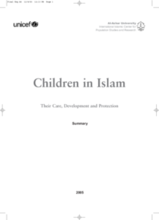Islam views childhood with hope and aspiration, seeing it as something to look forward to, seek and long for. When it is achieved, the fruit reaped is happiness of the soul, delight of the heart and elation of the chest. According to the Quranic text, progeny is a gift from the Almighty Allah to His faithful servants. It is also one of the bounties bestowed upon them by the Almighty Giver of Bounties, as well as being a fulfillment of the hope that sincere servants of God long for. “Unto Allah belongs the sovereignty of the heavens and the earth. He creates what He wills. He bestows female (offspring) upon whom He wills, and bestows male (offspring) upon whom He wills; or He mingles them, males and females, and He makes barren whom He wills. Lo! He is the Knower, Powerful.” [Al-Shura (Council): Verses 49-50]
Hence, it is not surprising that Islamic Shariah (law) pays utmost attention to securing all that is needed to guarantee a wholesome psychological climate for the rearing of children, a climate wherein they learn about the world and formulate their customs and norms. As such Islam affirms:
-
A child’s right to health and life.
-
A child’s right to a family, kindred, name, property and inheritance.
-
A child’s right to healthcare and proper nutrition.
-
A child’s right to education and the acquisition of talents.
-
A child’s right to live in security and peace, and enjoy human dignity and protection under the responsibility of the parents.
-
The caring role of society and the state to support all these rights and support families incapable of providing appropriate conditions for their children.
The Islamic Shariah states all of these rights, which are evident in the Quran and the sublime Sunnah of the Prophet Muhammad through his sayings and actions.

